Flights to Croatia: Condor to Split, Aegean Resumes in June, Emirates Postponed Again
May 23, 2020 - The latest news from around Croatia’s airports for flights to Croatia with updates from Zagreb, Split and Dubrovnik.
Croatian Aviation reports that German leisure company, Condor, announced they'd be resuming regular international lines from several German cities to well-known tourist destinations across Europe, including Split.
Before the outbreak of the pandemic, this German airline regularly flew on seasonal routes from German airports to Rijeka, Zadar, Split and Dubrovnik, but in the current summer flight schedule, the lines have not yet started operating.
In its last announcement, the company announced the resumption of operations, and the first line to Croatia will be introduced from the end of June.
From June 26, Condor will fly on two routes to Split:
Frankfurt - Split, from June 26, twice a week (Fridays and Sundays),
Dusseldorf - Split, from June 26, twice a week (Fridays and Sundays).
For the latest travel info, bookmark our main travel info article, which is updated daily.
Join the Total Croatia Travel INFO Viber community.
In addition to these two direct routes, the company, in cooperation with Lufthansa, also offers flights to Hamburg and Munich with short transfers. The mentioned lines will be operated by A320 aircraft, with a capacity of 180 seats.
Tickets are already on sale on the airline's official website. Split will thus be connected to Dusseldorf 3 times a week, considering that Eurowings, as we announced earlier, will fly between these two cities from June 20.
The airline has not yet confirmed the start of traffic from German cities to Zadar, Rijeka and Dubrovnik.
Furthermore, Croatian Aviation reported that Aegean Airlines announced new start dates for operations to destinations in Croatia.
The Greek airline plans to fly to 3 destinations in Croatia: Dubrovnik, Split and Zagreb in the current summer flight schedule. The line to Zadar was canceled in 2019.
Athens-Dubrovnik will be in operation twice a week from June 25, wit A320 aircraft. Aircraft of this type at Aegean has a capacity of 174 seats. The increase to five-week flights is planned for July 3.
The Athens-Split line has been announced four times a week from July 6, with the A319 aircraft, with a capacity of 144 seats.
The Athens-Zagreb route will again operate from July 1, three times a week, on A319 and A320 aircraft (capacity 144 and 174 seats, respectively).
Finally, Croatian Aviation reports that Emirates, an airline from the United Arab Emirates, has additionally canceled the start of operations on the Zagreb-Dubai route.
Although this seasonal line was supposed to start operating on the first day of the summer flight schedule, this did not happen due to the COVID-19 pandemic.
After that, the company repeatedly delayed the start of operations on this line, and the latest information was that this well-known company would come to the Croatian capital again from July 1 this year.
Emirates usually flies on the Dubai-Zagreb route every day, but due to reduced demand, flights are now postponed until August 1, when the line should start operating with only four flights per week (Mondays, Tuesdays, Thursdays and Saturdays). B47-300ER aircraft with a capacity of 354 seats have been announced on the route.
Given that this is the only seasonal Emirates route in the entire destination network, there is a high probability that this airline will not return to Zagreb this season.
Zagreb Budget and Related City Companies Under Huge Pressure
The Zagreb budget and the city companies that also rely on it are now finding themselves beginning to buckle under the pressure and strain caused by the economic crisis.
As Poslovni Dnevnik/Gordan Kozulj writes on the 22nd of May, 2020, the past few challenging months have shown how difficult it is for the world's largest economic powers to cope with the problems caused by the coronavirus pandemic.
The majority of the world is now entering the biggest economic crisis since World War II as the coronavirus pandemic continues to bite. But add to all of that, the devastating earthquake as well as the unenviable starting positions in terms of liquidity and indebtedness also had their effects, meaning that we can now get some sort of perspective of the state of the City of Zagreb and its related city companies.
The two-month shutdown of the economy and the damage caused by the earthquake led to a major blow to city finances, the Zagreb budget hasn't been immune.
The City of Zagreb is recording lower tax revenues, expenditure expectations are rising due to the need to renovate key pieces of city infrastructure, and liquidity problems have been going on for some time. The Croatian capital city has very little room for maneuver to absorb unexpected external shocks within the Zagreb budget, especially when it comes to the synergistic effect of multiple destructive events.
The city's expenditures have been burdened to quite a significant degree in the long run when it comes to subsidies to city enterprises or, like employee salaries, they're concretised by collective agreements. At the same time, freezing the prices of services, stopping work (eg charging for public parking) and reducing the sale of services (eg tickets for public transport) due to the introduction of quarantine measures, further aggravated the unenviable financial position of the Zagreb budget and related city companies, as it increased their dependence on that same suddenly enfeebled city budget.
The only way for the Zagreb budget and the city companies that are so closely tied to it to service their obligations and maintain liquidity is to increase borrowing, which is already being done on a rather large scale.
In fact, the collection of bank offers for a new loan for Zagreb in the amount of 350 million kuna is currently in process. It's good to remind ourselves that just before this crisis struck, Zagreb Holding additionally borrowed in the amount of 150 million kuna, as did ZET by contracting a loan in the amount of 537 million kuna for the construction of the much talked about Sljeme cable car.
Somewhat unnoticed in the midst of the coronavirus crisis at the end of March this year was the information that the credit rating agency Standard and Poor's (S&P) changed the outlook of the City of Zagreb from stable to negative, confirming its long-term credit rating of "BB".
More than ever, Zagreb's very functioning during these challenging times depends on decent cooperation with the central state. Namely, the capital expected the financial olive branch to come from the state through the adoption of a special law that would regulate its reconstruction and its co-financing.
In addition, the city initiated a proposal to the government to amend three laws related to the financing of local and regional self-government units (the Law on Financing of Local and Regional Self-Government Units, the Budget Law and the Budget Execution Act) so that it could borrow indefinitely. However, with the recent decision to dissolve Parliament, the possibilities for the timely adoption of such a new law or amendments to existing ones have been shut off.
The second lever to save liquidity the City of Zagreb is seeking lies in the sale of its property. It expects the fastest and most financially significant realisation in this sense to come from the sale of shares it holds in a company called APIS IT. But even in this case, the only serious buyer may be the state itself, which also showed interest in buying several years ago, but currently - the probability of this transaction is small indeed. From all of the above, the question arises whether Zagreb, in its most difficult moments in the last few decades, has been left without an important partner?
The only thing left for the Zagreb budget is to transform its crisis staff from one focused on protecting the resident population from the new coronavirus, to some sort of ''Financial Crisis Management Headquarters''. The establishment of such a headquarters requires the establishment of an expert team, strengthened by an agile organisational structure and an IT tool for generating various simulations.
In this way, the burdened Croatian capital would have the ability to make the quick and informed decisions needed to respond to these troubling financial challenges. The existence of professional support is not in question, it is only a question of the will and determination of the city itself.
* The author of this text is a senior manager in the business consulting department of Deloitte's consulting service
For more, follow our business page.
Flights to Croatia: Brussels Airlines Cancels Zagreb and Zadar, Eurowings Resumes in June
May 21, 2020 - The latest news from around Croatia’s airports for flights to Croatia with updates from Zagreb, Zadar, and Split.
Croatian Aviation reports that Brussels Airlines announced on Tuesday that in its current summer flight schedule, it would not fly to two destinations in Croatia - Zagreb and Zadar.
The company decided to cancel all unprofitable lines, as well as those bordering on profitability (in Spain, France, Portugal, Germany, Greece), which led to the cancellation of two lines to Croatia.
For now, Brussels Airlines will keep the Brussels-Split and Brussels-Dubrovnik routes on sale, while the routes to Zadar and Zagreb have been withdrawn from sale.
The Brussels-Zadar line was introduced in May 2018 as a seasonal line, while the line between Brussels and Zagreb was introduced in 2015.
On the route between Zagreb and Brussels, there will still be the option of a direct flight, as Croatia Airlines operates between these two cities twice a day in the conditions of normal air traffic.
Furthermore, Ex Yu Aviation announced that Eurowings would grow its presence in Croatia, but at reduced frequencies.
Namely, Eurowings will add services to the Croatian coast by resuming flights from Stuttgart, Hamburg and Dusseldorf to Split.
Its Cologne-Zagreb service, which has been maintained throughout most of the coronavirus pandemic, will be reduced from two to one per week in June. The lines from Hamburg and Dusseldorf to Rijeka, Dusseldorf to Pula and Cologne to Zadar will resume once per week on June 20.
“We can feel the growing desire of people to travel again and relax and enjoy their holidays after a long period of travel bans. This is exactly what we are now making possible with our extended summer schedule – reliably, safely and with all due caution. Travelling, whether private or professional, will be possible again," said Eurowings’ CEO, Jens Bischo.
Ex Yu Aviation adds that Eurowings’ parent company Lufthansa will not resume any of its destinations in the former Yugoslavia before June 15. You can read more about that on Ex Yu Aviation.
To read more about travel in Croatia, follow TCN's dedicated page.
Visit Zagreb Now: Never Has the City Been More Beautiful
May 20, 2020 - A first visit to post-earthquake Zagreb, and a big surprise - never have I enjoyed visiting the Croatian capital more. Zagreb is magnificent right now.
It is almost two months since the devastating March 22 earthquakes in Zagreb. Like everyone else, I watched the tragic images with heartache. Corona travel restrictions meant that I could not visit, and I had to keep in touch with my friends and TCN colleagues from distance.
With all the yearning for travel, Zagreb was the only place I wanted to visit, to walk its streets, share its pain, empathise with its people.
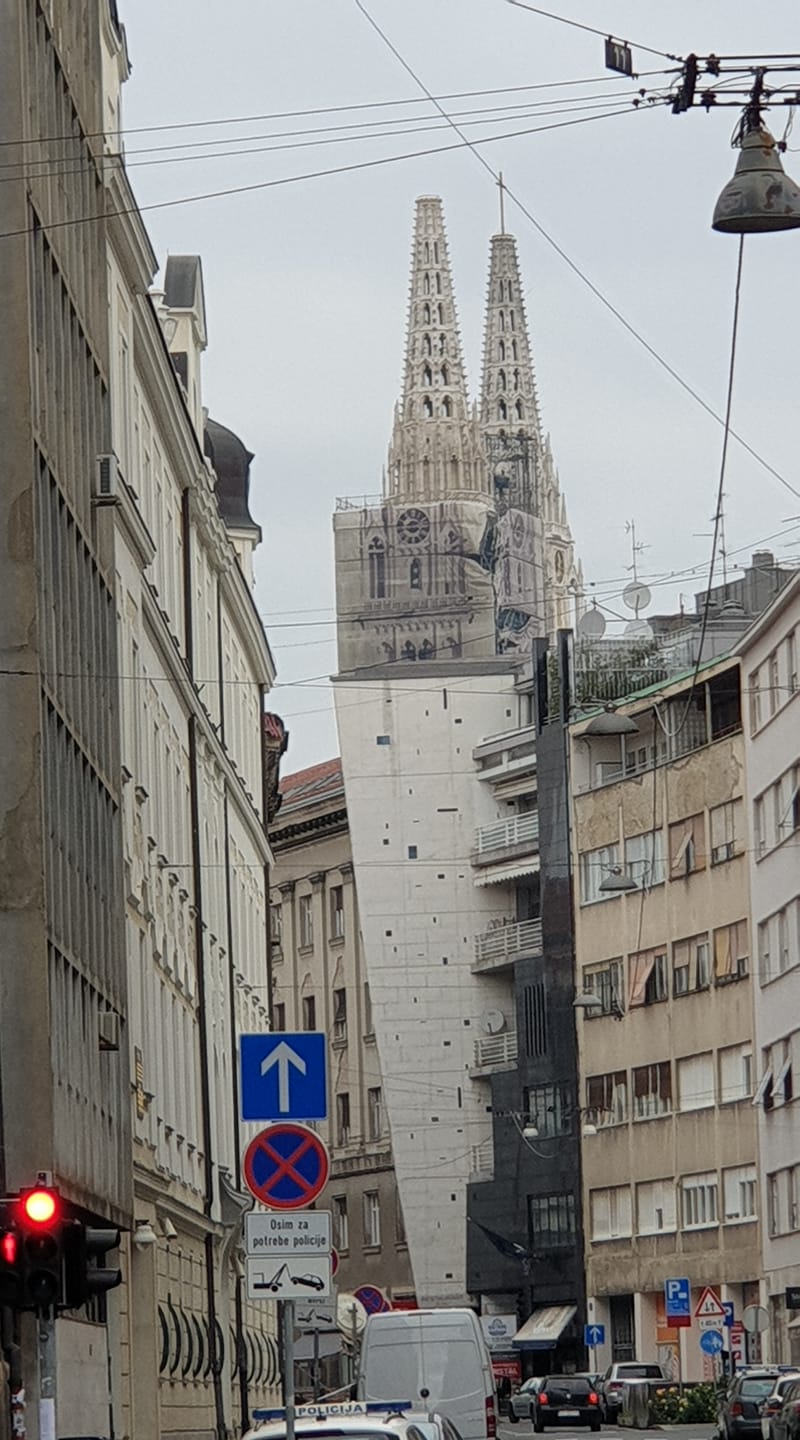
I was actually nervous as we entered the city. What awaited me? And how would greeting friends be in this new lesser-contact world? I also felt a little guilty that while they had been confined to apartments, I had had the freedom of one of the most beautiful islands in the world on Hvar.
What I actually discovered stunned me. For I can genuinely say that I have never found Zagreb more beautiful, more peaceful to roam its streets and parks, or more at peace with itself. Perhaps the little cross on the top of one of the cathedral's spires, a recent addition, was a symbol of that.
I arrived on Sunday, a non-working day in Croatia with elections approaching, and the ruling government reaching out to its conservative base, and so the centre was emptier than usual. Less humans, more birds.
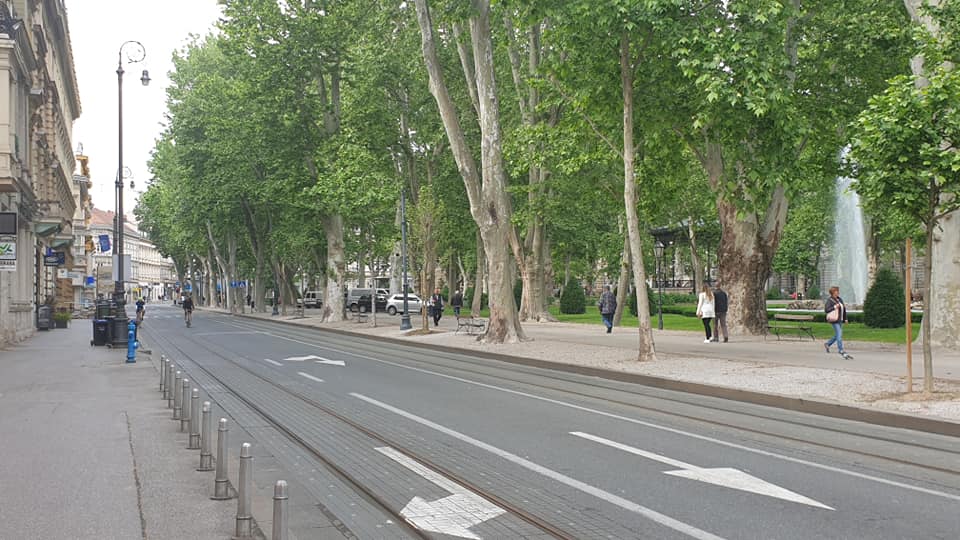
I found myself walking down the middle of the street at times, as there was so little traffic (it was a Sunday, remember). And on Zrinjevac, some new parking spaces. After the earthquakes, residents move them away from the buildings to lessen the risk of damage from another earthquake. I wonder how long this arrangement will last.
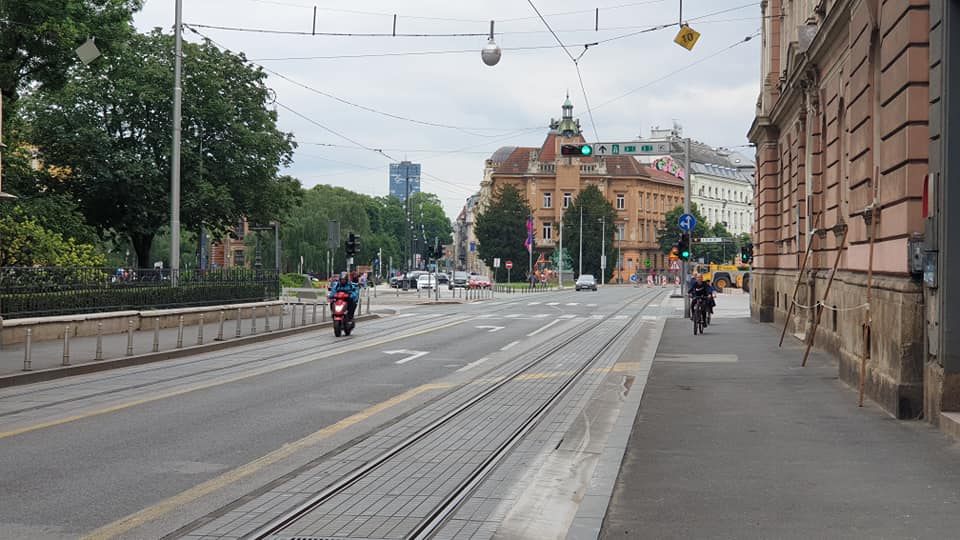
The streets were emptier, the air was noticeably cleaner, Mother Nature was enjoying a relaxing weekend, and the sun was shining. It was divine.
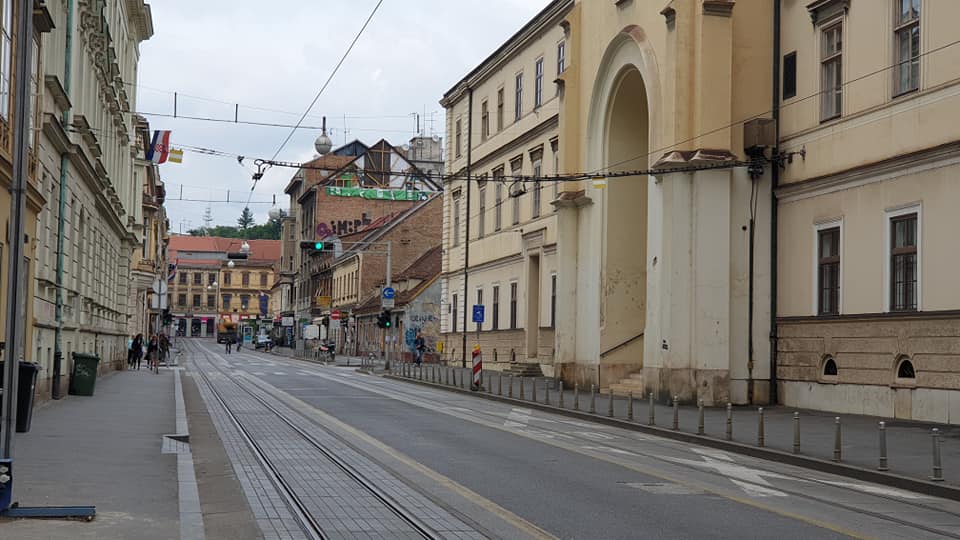
No doubt the shops being shut had a big effect on the lack of people about, but it certainly added to the enjoyment. But one thing I noticed about the people who were out. They were happier, much happier, than the normal faces one sees on the street. I was curious to see how my friends would be after this intense period of their lives. And they were all much more relaxed, calmer and more reflective on what they had been through and the new realities of life. Corona has wreaked havoc and destruction, but it has also contirbuted much to a mindset reset for many people, and they may yet bring great benefits.
Daily life continuing. A family playing table tennis in the park.
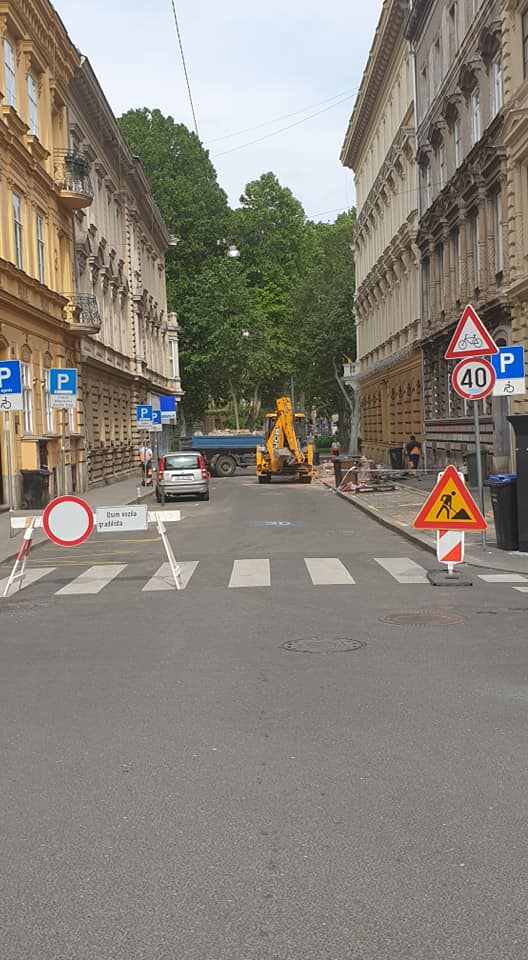
I was expecting to see a lot more devastation around the city. It has been cleaned up extremely well (never have I seen it cleaner) and the rubble which remains has been swept into piles in parking spots.
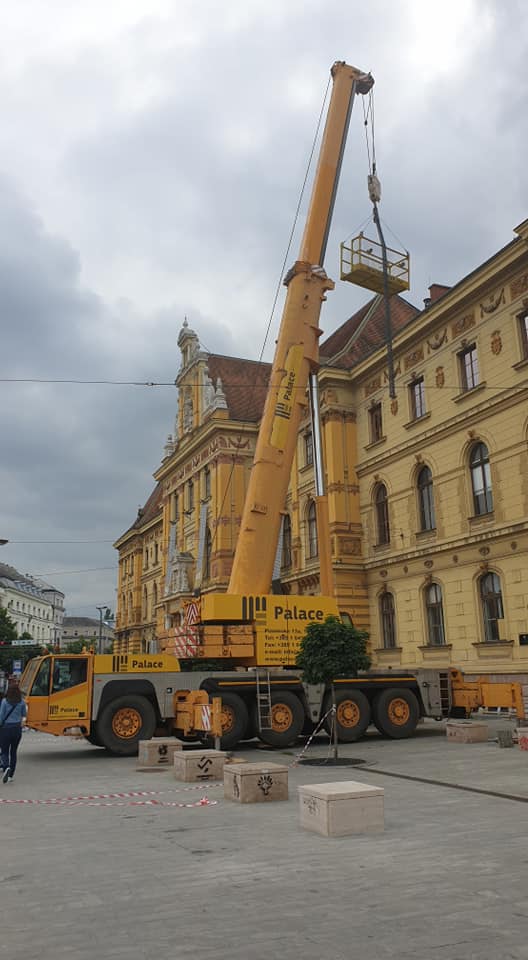
Some streets are closed, and the cranes are out.
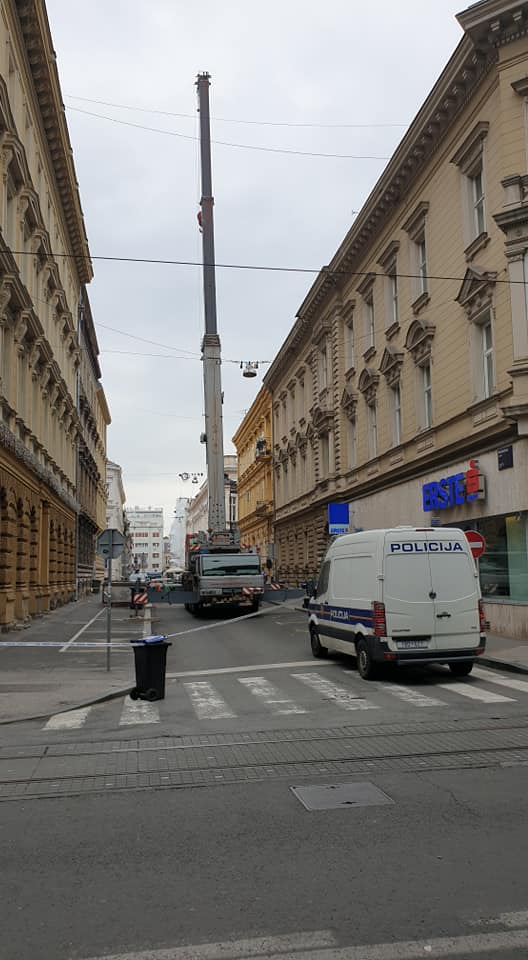
I was expecting a lot more disruption, a lot more cranes. They were there, but there were not a major feature. The major feautures for me were nature, calm, happier people. It was a wonderful thing to experience after months of being at home.
The shops might be shut, but the cranes were working.
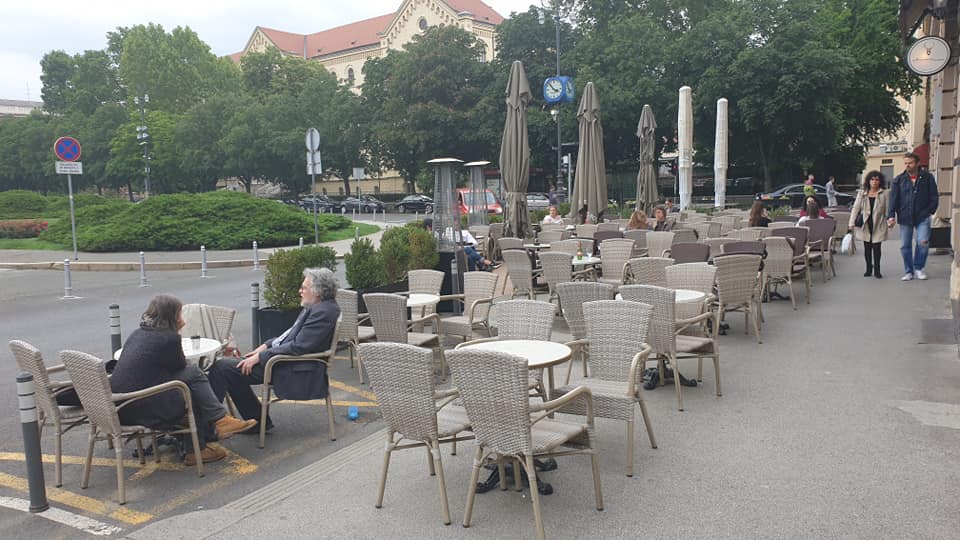
Most cafes were shut (not sure if this was standard for the moment, or due to Sunday), but those that were open were less crowded, more relaxed, fun to chill out in.
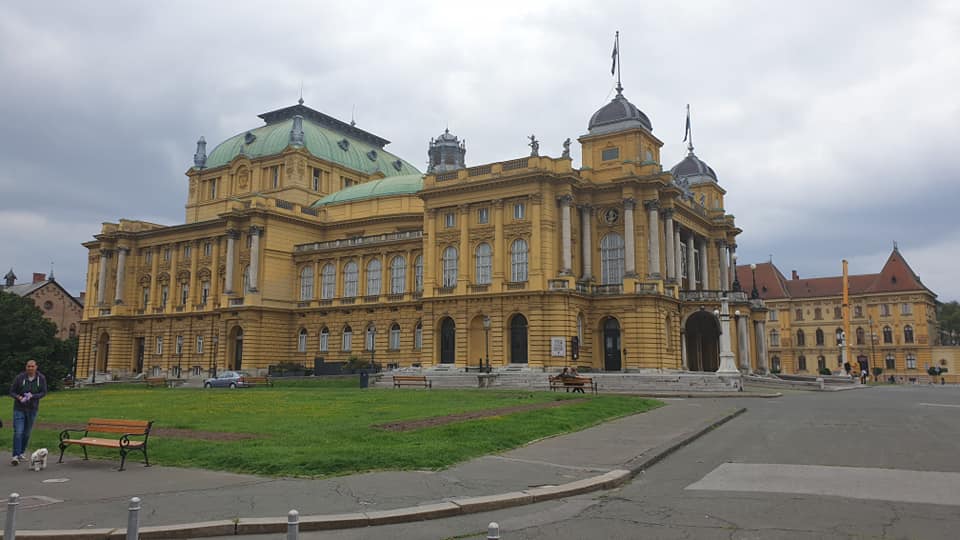
Less people and more time to enjoy the magnificent architecture of the city.
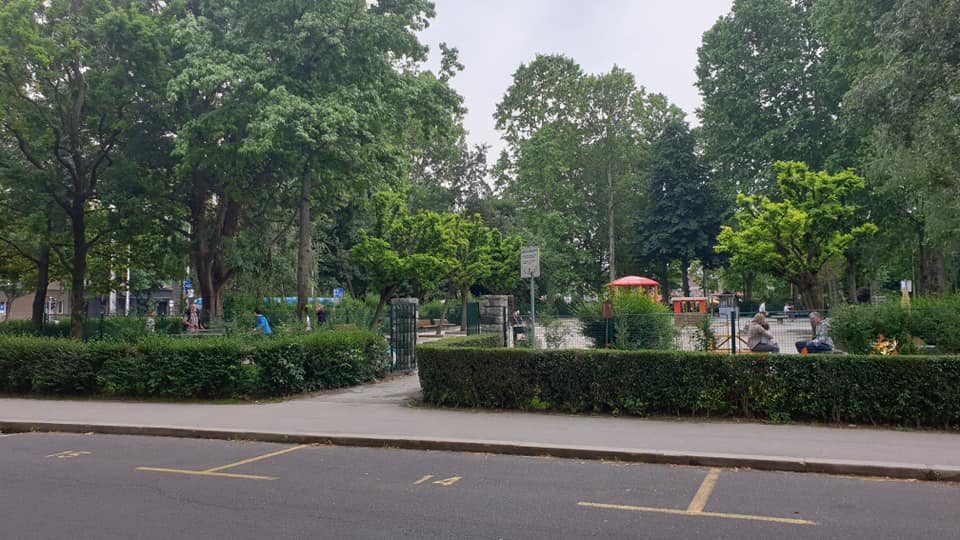
And its nature.
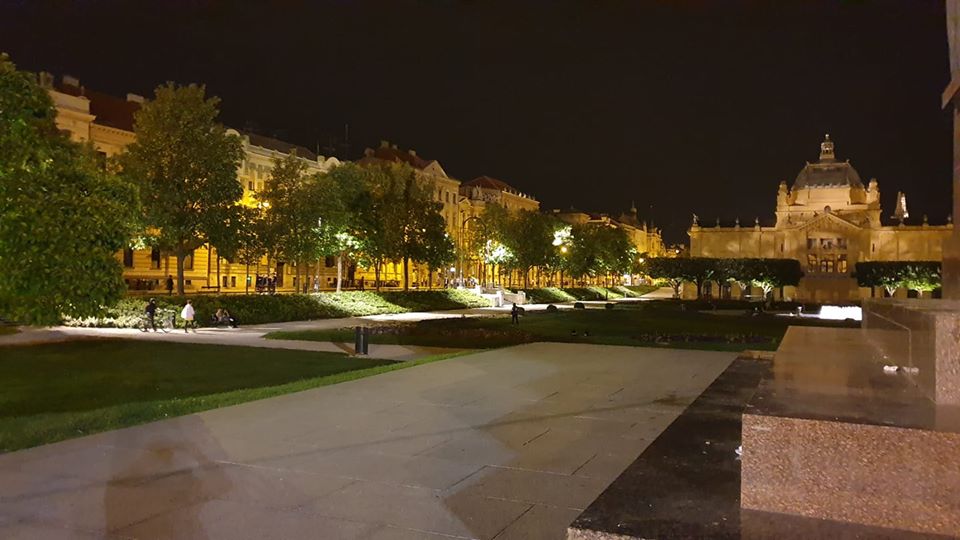
And Zagreb by night was a joy. Just as it felt that I had the island of Hvar to myself during lockdown, so too the city centre of the capital by night.
If you are travelling at the moment and Zagreb is on your radar, visit now, while this magical period of Mother Nature partially controlling the city still exists, as it will almost certainly change when the humans are allowed out to play.
You can learn more about Zagreb in our Virtual Croatia series - Tourism in the Corona Age: 10 Virtual Tools to Discover Zagreb.
Minister Says Zagreb Earthquake, Reconstruction Process Should Not Be Politicised
ZAGREB, May 17, 2020 - Culture Minister Nina Obuljen Korzinek has said that the March 22 earthquake in Zagreb and the reconstruction of the city should not be politicised, calling on all interested stakeholders to join in public consultation on a bill on the reconstruction of Zagreb following the March 22 quake.
Obuljen Korzinek's comment was a response to a protest staged on Sunday outside government and parliament offices by about 20 people, leaders of the parties We can! Zagreb is ours!, New Left, ORaH, Workers Front and For the City, and their supporters who are dissatisfied that the parliament will be dissolved before the law on the reconstruction of Zagreb is adopted.
Last Friday the government put to public consultation a bill on the reconstruction of buildings damaged in the quake that hit Zagreb and Krapina-Zagorje and Zagreb counties, Obuljen Korzinek told Hina, calling on interested stakeholders to put forward their proposals and join in the process of consultation as the reconstruction would last for years and would be a very complex process.
Speaking of emergency measures that have been taken in the meantime, the minister said that HRK 141 million had been secured through a budget revision for the emergency reconstruction of buildings and purchase of new boilers and that a decision had been made to pay the rent for people whose property had been made unlivable by the quake.
"The government is preparing a set of measures, work has been underway to appraise the damage and prepare documentation for funding from the European Solidarity Fund, a loan from the World Bank and other sources of financing," she said.
Zagreb Loves You, Latest from Croatia's Best Destination Promo in Corona Era
May 15, 2020 - Zagreb Loves You, and we love the Zagreb tourism promotion campaign during these difficult times, even without the earthquake. The best campaign in Croatia.
One of the most fascinating things from a tourism point of view in recent months has been to observe how the tourism industry has approached this unique set of circumstances. In an age where people could not physically travel, was there any point in even mentioning tourism at all?
The reaction of official tourism bodies was very diverse. Some tried to ignore the reality that there was a global pandemic going on, promoting tourism as though nothing was happening. Others simply went into hibernation and disappeared off social media. And many others, after a period of confusion, joined the global trend of Dream Now, Travel Later.
And while I saw many alluring photos and enticing videos, there was only one destination that I really craved during my lockdown on Hvar. And it was the destination which truly bared its soul these past few weeks, allowing future visitors to get to know it intimately. And it was the destination which easily had the best campaign to promote itself during these terrible months of any destination in Croatia.
Zagreb.
More than two months ago, and a week before the devastating Zagreb earthquakes, I wrote an article after a chat with the Zagreb Tourist Board. Yes, tourism was technically still possible, but with the situation changing by the hour, perhaps now was the time to put travel on hold and think about tourism in the future. With people spending more time at home and with more time on their hands, why not encourage people to stay safe, travel later AND give them lots of content to explore now while they had the time. Here is the article Tourism in the Corona Era: 10 Virtual Tools to Discover Zagreb.
We certainly weren't the first in the world to come up with the concept of 'dream now, travel later' which has become such a one-dimensional strategy in recent weeks, but the concept of creating the desire AND giving lots of virtual content so that people had time to explore was new. And that Discover Zagreb article was one which inspired the recent TCN Virtual Croatia campaign.
Then the devastating events of March 22 took place, as the earthquakes hit at the height of the pandemic. A terrible time for the people of Zagreb, with corona on the outside, earthquakes on the inside. How to even consider promoting tourism at a time like this?
My heart went out to the people of Zagreb, many of whom are my close friends in a city I have come to love in recent years after a lukewarm start to the relationship 18 years ago. If I had desire to go anywhere in these travel-restricted times, it was to the Croatian capital.
Was that partly due to my wish to show solidarity for the people of Zagreb and my many friends there, or was that love of the city enhanced by the lovely official campaign, the like of which I have not seen elsewhere in Croatia in recent weeks.
For Zagreb did what no other destination did - it bared its soul. Invited people into its most secret corners, allowing people to connect to the destination in a way I did feel anywhere else.
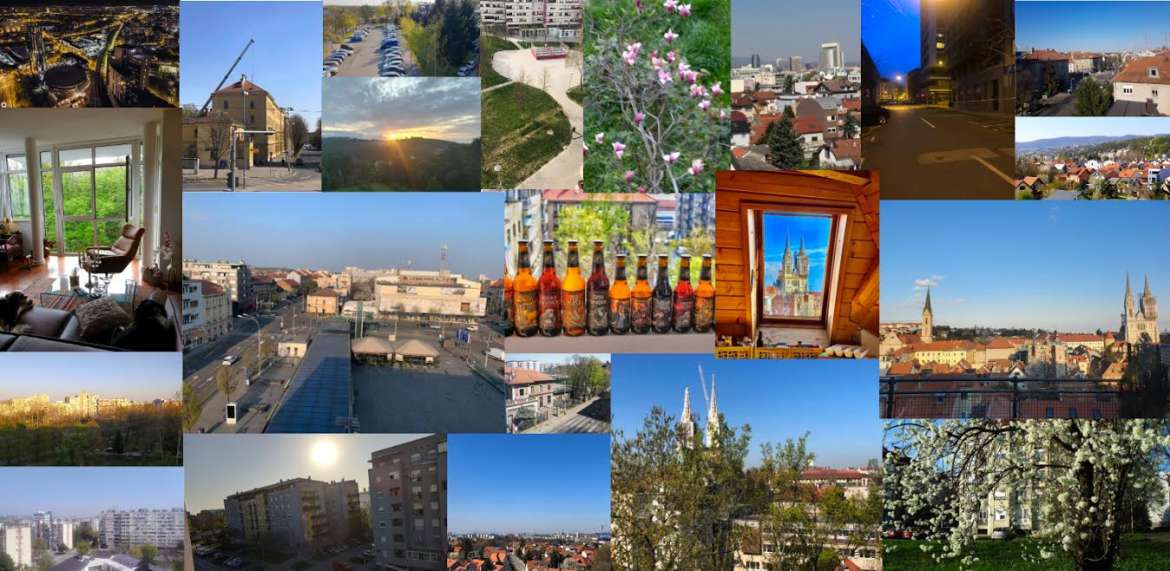
Perhaps it started with the immediate aftermath of the earthquake and the very poignant video posted the same day.
Perhaps it was the emotion of seeing the top of the second cathedral spire removed.
But something happened. And while other destinations shared photos of beaches and sunsets that can be found all over the world, Zagreb sucked people into its every corner, its citizens keen to show every aspect of the city and how they were resiliently dealing with all the tragic events.
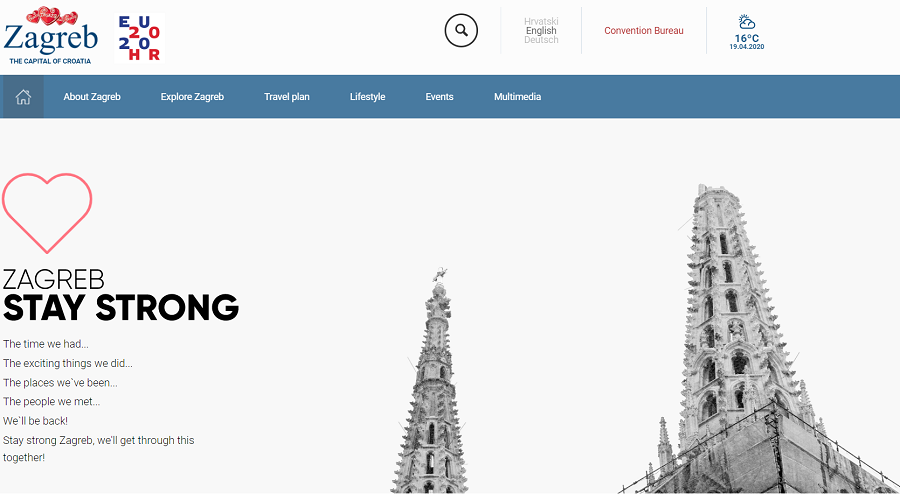
Last month, I wrote about the continuing campaign in Damaged But Resilient: Brilliant Zagreb Tourist Board Virtual Campaign.
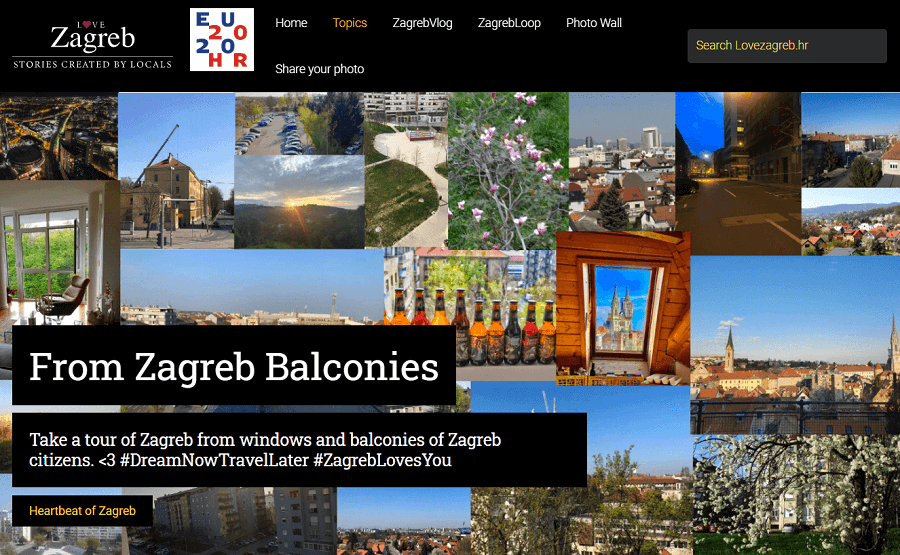
It includes great campaigns such as 'From Zagreb Balconies' where citizens have been sending their balcony views of the Croatian capital - a delightful cross-section of shots of the city, which you can explore here.
The Zagreb Tourist Board has also created a wonderful virtual section on its website called What to Do at Home.

One of the best resources for understanding the complete situation in this beautiful city under attack from corona and earthquakes is the Love Zagreb blog, another Zagreb Tourist Board project online, which brings the heartbeat of the city into your living room. There were some fabulous texts written in recent weeks. If I could pick out a few to check out, they would be:
Zagreb - A City With a Spirit of Steel
In The Times of Hardship, We Stick Together
You Can Still Have Fun While Staying Indoors
Zagreb's Virtual Farmers' Market
I have been coming to Zagreb for years, once a week minimum pre-corona, but now I was learning something new on a weekly basis, new places to explore when all this is over.
This month brought a new month of discovery and emotion.
Zagreb. Be There. Again...
And I will be. Tomorrow. Leaving Hvar for the first time in two months, destination Zagreb. I am excited but strangely nervous about what I will find. I, who have travelled the world, lived in 10 countries and visited 96.
A new month. A new campaign, with the dulcet tones of Emmy Award-winning reader, Rob Reider.
Zagreb Loves You.
This video is made of memories... and soon... we will be making new ones. With YOU!
Can't wait to see you again in Zagreb!
And nor can I. Until tomorrow, then.
The campaign runs until May 19, and there have been more than 300 submissions so far, making it more popular than the Zagreb balconies feature.
And I will be adding my own contribution tomorrow, as well as eagerly awaiting the next phase of the campaign.
Follow the latest on the official Zagreb Tourist Board Facebook page.
MIVA Wine Gallery in Zagreb Organizes Online Whisky Workshop
May 14, 2020 - MIVA Wine Gallery in Zagreb is organizing an online whiskey workshop on Thursday, May 14, at 8 pm. The Moët Hennessy brand ambassador will take you through the world of whiskey drinks, more precisely the world of Glenmorangie and Ardbeg flavors!
On Saturday, May 16, the world celebrates World Whiskey Day. The Miva Wine Gallery traditionally holds online workshops and tastings on Thursdays, and this time we will once again hang out with the Moët Hennessy brand ambassador, Mr. Ted Lelekas. The great connoisseur Ted Lelekas is in charge of education and guided tastings of the entire Moët Hennessy Group portfolio in more than 15 countries. He is a member of the Board of Directors of the International Federation of Journalists in the World of Wine and Spirits. He regularly has the role of a judge in many prestigious international competitions in the world of wine and spirits.
The event will focus on Highland Distillery Glenmorangie, a whiskey brand that has the giraffe as a symbol and recognises the serious threat this animal faces in the wild. Few are aware of the threat it faces in the wild. Numbers have fallen by 30% in 30 years, with some types of giraffes now critically endangered. With the giraffe’s decline going largely unnoticed, a BBC/PBS documentary on the work of the Giraffe Conservation Foundation (GCF) and its partners, narrated by Sir David Attenborough, has warned of a “silent extinction”.
Known as the Distillers of Tain, they’ve been honing their craft for more than 175 years in Scotland’s tallest stills, and produce a light and fruity spirit, ripe for experimentation. Glenmorangie’s demonstrates its commitment to the endangered animal that is their symbol by forging a global conservation partnership to help safeguard its future. Launched in January 2020, Glenmorangie’s partnership with RZSS and GCF will run until the end of 2022. By supporting the work of its partners, Glenmorangie will focus on the threatened Nubian (formerly known as Rothschild’s) giraffe. Once widespread across East Africa, just 3,000 of these giraffes survive in the wild, with more than 50% of these in Uganda. The largest population lives in the country’s Murchison Falls National Park. Glenmorangie’s support is twofold.
It will support the work of GCF in the following areas with investment for expert staff, vets and equipment, so they can protect giraffes from habitat loss and poaching (illegal hunting); reintroduce giraffes back into their natural range in Uganda, focusing on areas where the Nubian giraffe has become locally extinct; tag giraffes with GPS satellite tracking devices so that their populations can be effectively monitored, and their movements better understood; train and build the capacity of African conservationists in giraffe conservation and management. Glenmorangie will also support the conservation work of RZSS so that it can: Open a specially-designed giraffe habitat at Edinburgh Zoo in the summer of 2020 and aid GCF’s conservation work with genetic research into new giraffe populations. Genetic research is vital for reintroduction programmes, helping to avoid inbreeding, and Edinburgh Zoo has one of the world’s only zoo-based genetics laboratories.
Thomas Moradpour, President and Chief Executive of The Glenmorangie Company, said: "For 175 years, we have created whisky, in stills as high as an adult giraffe, the tallest in Scotland. Over time, this majestic animal has become a beloved symbol of our brand. It seems only right that we should channel our passion for this animal into our new global conservation partnership with GCF and RZSS. Together, we will work to protect giraffes in the wild and shine a light on their predicament before it’s too late.
About Glenmorangie’s stills:
Glenmorangie distills its Highland single malt whisky in its copper stills, the tallest in Scotland, which are around the same height as an adult male giraffe. These stills take Glenmorangie’s whisky on a longer excursion, resulting in a lighter spirit with more ‘space’ for taste and aroma. Glenmorangie’s giraffe symbol can be seen in many places around the Highland Distillery – eagle-eyed visitors may even spot it in a stained glass window in the majestic still house.
About the Royal Zoological Society of Scotland
The Royal Zoological Society of Scotland (RZSS) is a wildlife conservation charity (SC004064) and owns Edinburgh Zoo and Highland Wildlife Park. Founded in 1909, the Society’s purpose is to connect people with nature and safeguard species from extinction. For further information about RZSS conservation projects in Scotland and around the world, please visit rzss.org.uk
When purchasing any Glenmorangie or Ardbeg item via the MIVA webshop or MIVA wine shops, you are entitled to participate in this whiskey online workshop.
* You will receive the ZOOM link of the workshop by e-mail after purchasing the Glenmorangie or Ardbeg item.
* The workshop will be conducted in English.
To read more about lifestyle in Croatia, follow TCN's dedicated page.
Government to Pay Rent for People with Homes Damaged in 22 March Zagreb Quake
ZAGREB, May 14, 2020 - The government decided on Thursday to finance rent for those people whose property was damaged in the 22 March quake in Zagreb and its environs and Krapina-Zagorje and Zagreb counties, defining a maximum amount of HRK 70 per square metre of the rented space.
Owners of family homes, apartments and protected renters whose property has been declared unfit for occupancy, will have the cost of rent subsidised.
Rent will be paid to owners who do not have any other accommodation within 20 kilometres of the damaged property. The absolute amount is restricted by the size of the rental per each member of the family and price per square metre.
Rent will be covered to a maximum amount of HRK 70 per square metre.
"That means that a single household renting an apartment will receive a maximum of HRK 2,450 a month which covers the cost of a 35 square metre flat for a price of HRK 70 per square metres while a family of four will receive HRK 4,550 a month which can cover the cost of a 65 square metre flat for HRK 70 per square metres," State Assets Minister Mario Banozic explained.
By 11 May a total of 19,459 buildings had been inspected and 1,112 have been categorised as not fit for use due to the damage caused by the 22 March quake.
The government estimates that the average cost of rent will amount to HRK 3,500 while the funds needed to implement this measure amount to HRK 52.5 million and will cover the period until 1 September 2021.
As these are acceptable costs, the government will apply to the EU solidarity fund to cover the costs of this subsidy.
(€1 = HRK 7.55)
Bandić Says Not Likely to Support Dissolution of Parliament without Law on Zagreb
ZAGREB, May 12, 2020 - Zagreb Mayor Milan Bandić said on Tuesday that the parliamentary group of his Work and Solidarity Party was unanimous that it would not support the parliament's dissolution if parliament did not previously vote in a law on the reconstruction of Zagreb.
Bandić said he would be happy if the law was voted in by the current parliament, adding that even though this was difficult to expect, he had heard that the bill would receive first reading "as early as next week."
Bandić believes that the law on the post-quake reconstruction of the capital city could be adopted under fast-track procedure.
"There is still time for those in charge at the state level to respond appropriately because this is a top priority," said Bandić.
Commenting on announcements that people in self-isolation would be allowed to go to the polls in the coming parliamentary elections, Bandić said that the precondition for holding elections "is a zero or close to zero rate of the coronavirus."
"Anything that would put citizens' health at risk would constitute the scoring of cheap political points and timing elections to suit one's own interests. I'm against that and we will be against that."
More election news can be found in the Politics section.
British Airways Will Fly to Zagreb and Split from June
May 12, 2020 - British Airways announced its flight schedule for June, which includes two destinations in Croatia - Zagreb and Split.
Croatian Aviation reports that according to the current schedule, the British airline will fly to Zagreb and Split next month in a significantly reduced flight schedule compared to their operations before the outbreak of COVID-19.
Namely, from June 1, British Airways will fly between London (Heathrow) and Zagreb three times a week (Mondays, Fridays, and Sundays) on the A320 aircraft.
The route between London (Heathrow) and Split will operate from the same date. The line will run four times a week in June (Mondays, Thursdays, Fridays, and Sundays).
Seasonal routes to Dubrovnik and Pula on British Airways are not on sale for now. It is expected that the number of weekly flights to Zagreb and Split will increase in July, and then the lines from London to Pula and Dubrovnik could start operating in a reduced form.
Croatian Aviation also touched on how air traffic to Croatia will look after the pandemic. Given that the world is still somewhat on lockdown, it is tough to predict all the details, but if the traffic at Croatian airports is 50% of that in 2019, airports will be satisfied.
Croatia began to attract large international airlines, which, in turn, managed to survive in our market. Some will return this summer, some next, and some will kick Croatia out of their network of destinations.
American Airlines canceled Dubrovnik for this year and removed all B767 aircraft from the fleet, which is the aircraft on this route. If the situation in the world stabilizes soon, this line could return to traffic as early as next summer. Last year, American introduced the route to Dubrovnik along with several other European destinations, and it was the airline's best hit among all other routes, which flew to far larger European cities. The line started operating three times per week, and another trip was added in September. The announcement for this year was great, as American was supposed to fly to Dubrovnik every day!
Air Canada Rouge has canceled the Toronto - Zagreb route for this year and will remove all 25 B767 aircraft from its fleet. The question arises as to how the long-haul Air Canada Rouge network will function in the future given that this was the only long-haul type of aircraft in the carrier’s fleet. Air Canada has announced several times so far that it does not plan to launch a route to Zagreb, but that the Rouge branch will operate it, so there are no great prospects for the arrival of this carrier. Given that demand will be lower and that the Air Canada mainline has cut a large number of routes, Rouge could use Air Canada aircraft in next summer's flight schedule, which would definitely be a plus for the travel experience.
Air Transat has delayed the Toronto-Zagreb route for July, but we can expect the complete cancellation of this line. Will this carrier return to Zagreb? Most likely. Air Transat is a leisure company, and if Air Canada Rouge does not return, Air Transat will have no competition on this route and will certainly profit.
Korean Air has also canceled the line between Seoul and Zagreb for this year. Given the financial situation of this company, if Korea does not react through state aid, the company will have to go through a major restructuring, and in that case, the line to Zagreb will not return as it has been operating since September 2018. However, the company can do what it did before 2018 - introduce regular charter flights on this line.
Qatar Airways has reduced the number of departures to Zagreb, and there is no fear that this carrier will not return to Croatia given that this line is maintained by tourists but also Croatian and Slovenian citizens, especially because Qatar Airways does not fly to Ljubljana and the choice for passengers departing from Ljubljana was slim even before the pandemic. Qatar, therefore, canceled the planned line to Dubrovnik. Given that this airline has been in negotiations with Dubrovnik Airport for years on establishing a line between Doha and Dubrovnik, its introduction is expected, if the situation stabilizes soon, next year.
Emirates has reduced Zagreb and plans to fly again on the route from Dubai in July. This carrier, which has only large capacity aircraft in its fleet (B777, A380) is currently in trouble. The small flexibility of the fleet, especially in capacity, makes it impossible to adjust market demand and it is now obvious that this airline had to have long-haul aircraft of smaller capacity in its fleet as well. Over 300 seats on the departure from Zagreb were often too many (except for the peak season). The line may be canceled entirely this year, and it would be logical for partner FlyDubai to operate on it with a significantly smaller capacity, the B737.
Thai Air Asia X has planned several rotations in the summer flight schedule between Bangkok and Zagreb. These were intended regular charter flights that will certainly not happen this year.
To read more about travel in Croatia, follow TCN's dedicated page.


